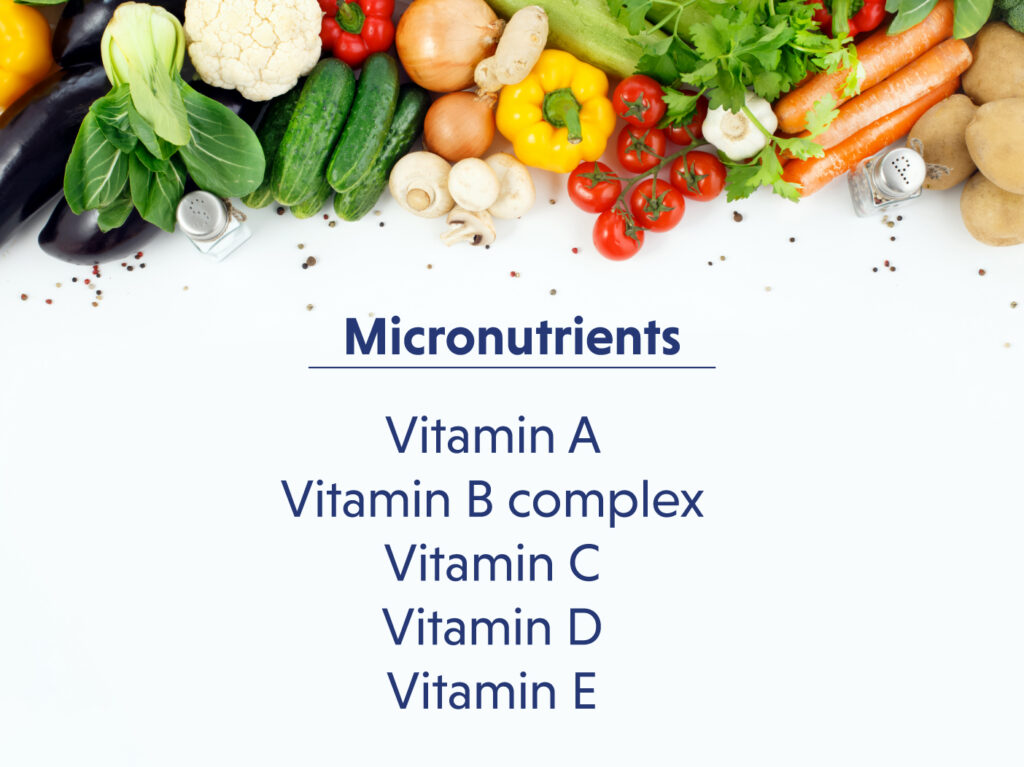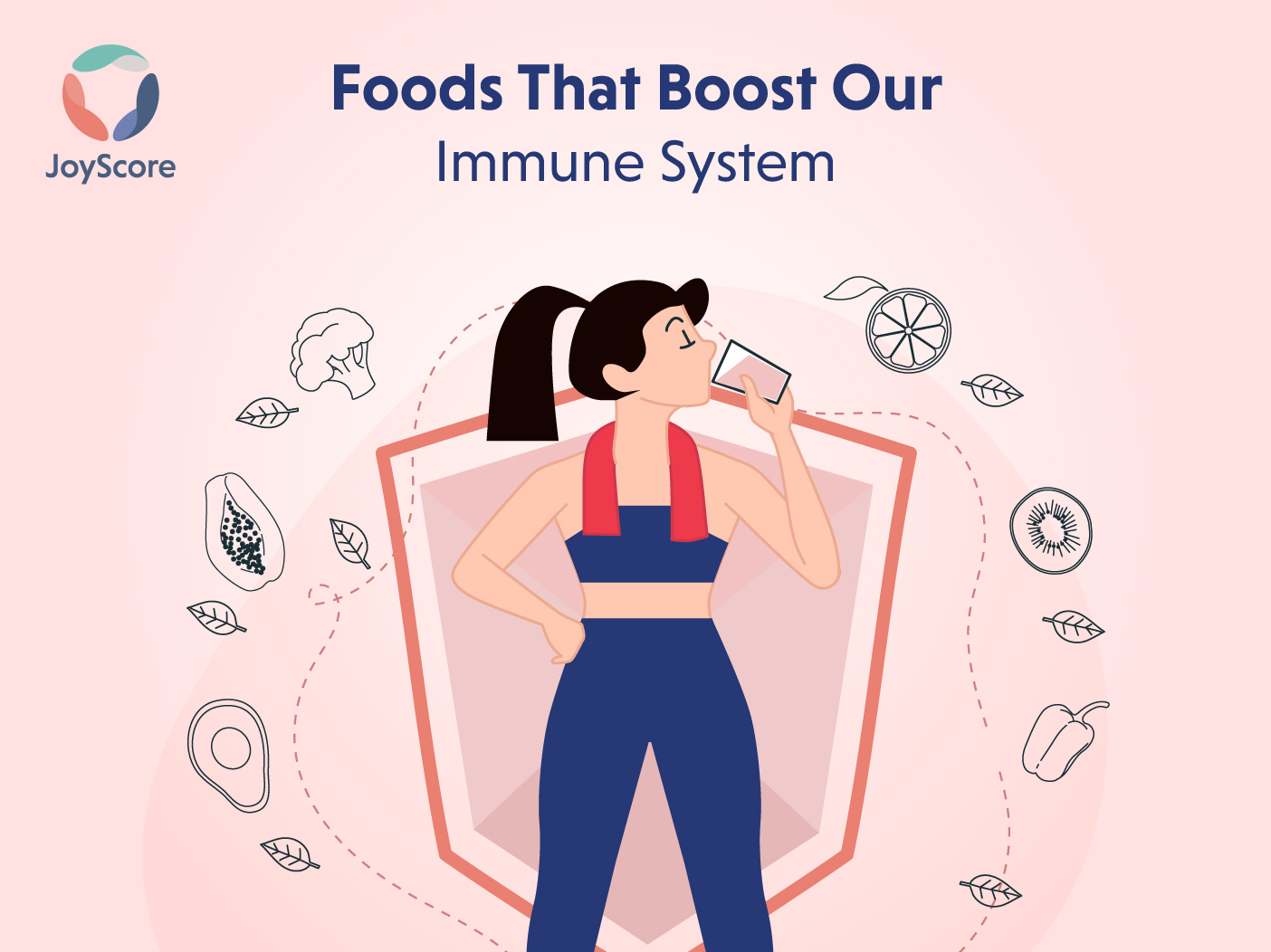Food and Immunity-Is there a connection
Do you have a bad cold with sneezing and a coughing spree? Then you will be getting advice from all the people around you to take ginger, honey, and lemon tea or a dose of vitamin C to bring down the infection. The fundamental basis of this is the role of good nutrition to boost the immune system for fighting the infection. Maintenance of good health is impacted by factors such as regular exercise, a good amount of sleep, and stress-free life. But a balanced diet can replenish what is lost during an illness and augment the immune responses. Nutrition plays an essential role in building our immune system and helps to strengthen it.

Our Immune system – The fighters
Our bodies are continuously exposed to attacks from numerous foreign entities. They include infections caused by bacteria, fungi, viruses, or other microbes. They can sometimes turn fatal if our immune system does not function properly. Immune cells have to be constantly on a vigil and check on any cancerous growths or any unwanted responses against self or harmless foreign bodies.
To keep these immune cells healthy so that they can perform their functions well, it is necessary to feed them with the right nutrients. There are different types of dietary factors essential for maintaining a strong immunological balance and protection against pathogens. Many studies have supported the role of the immune system in countering and reducing the risk of infections1
Role of Nutrients
Both macro and micronutrients are needed for the smooth functioning of the immune system. Macronutrients refer to nutrients required in large amounts by the body, including carbohydrates, proteins, and fats. Whereas micronutrients are needed in small amounts, such as vitamins and minerals. Several micronutrients have also been shown to boost our immune responses2. Vitamins such as A, B, C, D, E, folate, and minerals such as Zinc, copper, iron, and selenium serve as natural immune boosters2.
It’s better to eat citrus fruits rather than pop a tablet of Vitamin C. Cook up a meal with colorful veggies and get a good combination of vitamins, minerals, and fiber to increase your immunity. Try not to rely on supplements; instead, get tons of nutrition through a robust and balanced diet that supports your immune system.
So, let’s delve into the world of health and immunity by learning about some foods packed with nutrition.
Macronutrients
The daily dose of proteins
Proteins do not just help build strong muscles but are made up of amino acids, which augment various immune cells that help fight off bacterial and viral infections. Both plant-based and animal-based proteins help to build a strong immune system. Foods such as barley, wheat, rice, oats, corn, buckwheat, quinoa, amaranth, and rye are high protein sources. Various pulses and legumes are also added to the list. Milk products, eggs, meats, chicken, and fish are also the best sources but going for lean cuts is better with baking, boiling, or grilling as the method of cooking. Other sources include soybean, nuts, and seeds such as almonds, walnuts, peanuts, chia seeds, and pumpkin seeds. It is recommended to get at least 40-60gms of protein every day to maintain a healthy immune system.
Are carbohydrates healthy?
Carbohydrates are also called carbs or saccharides; they get broken down into glucose and serve as energy providers for different body organs. Carbohydrates can be simple or complex, depending on their structure. Ever wondered if carbohydrates have any other role than satisfying our sweet tooth cravings? Believe it or not, complex carbohydrates such as brown rice, beans,, peas; starchy vegetables such as parsnip, sweet potato, yams, beets, pumpkin, and turnip; fruits and whole-grain bread, all are excellent sources of carbohydrates, which improve our immunity.
Healthy Fats = Healthy Immune system.
Many research studies have emphasized the importance of incorporating healthy fats into one’s diet. Reducing the consumption of saturated fats such as palm oil, lard, butter, red meat, cream, cheese, and full-fat dairy products in addition to trans fats has several benefits. Many packaged foods often contain the label ‘partially hydrogenated oil; one should eliminate such foods as they are sources of inflammation and affect heart health. Products that may include cookies, biscuits, crackers, doughnuts, margarine, and pie crusts.
On the other hand, healthy fats that can elevate our immune responses can be obtained from foods containing essential fatty acids. Foods rich in monounsaturated and polyunsaturated fats such as omega-3 and omega-6 fatty acids protect against and prevent heart disease arthritis and help blood clotting. They also help to keep inflammation in check. Examples of natural sources of good fats are fatty fish like salmon, mackerel, sardines, tuna, herring, and trout. Other healthy foods and oils include olive oil, canola oil, safflower and sunflower oil, nuts, seeds, Avocado, coconut, edamame, walnuts, and flaxseed oil.
Micronutrients- ‘Not so micro.’
Vitamin A has anti-inflammatory potential and helps to fight infections. The foods rich in Vitamin A are carrots, dark green leafy vegetables such as spinach and kale, sweet potatoes, red peppers, pumpkin, liver and fish oils, fish like salmon and tuna, yogurt, eggs, yellow fruits such as mango, papaya, and apricots.
Vitamin B complex (B1, B2, B3, B6, B7, folate and Folic Acid, B12)-Keeps the nervous system healthy, balances the immune system, and helps in faster wound healing, also helps in building new red blood cells, thereby supplying oxygen to different body parts. Good sources of vitamin B include Peas, fruits (oranges, bananas), nuts, whole-grain bread, some fortified breakfast cereals, mushrooms, yogurt, fish, eggs, chicken, avocado, oats, peanuts, milk, and soybeans. Folic acid can be obtained from foods like broccoli, cabbage, brussels sprouts, kale, spinach, spring greens, liver, and kidney beans.
Vitamin C, also known as the builder of immunity, helps increase the infection-fighting cells in the body and heal wounds and be an excellent antioxidant. Vitamin C obtained from foods can help maintain healthy bones, skin, and teeth and improve absorption of iron from the diet. There are abundant sources of Vitamin C, and they extend beyond your citrus fruits and juices. Several vegetables like potatoes, tomatoes, broccoli, brussels sprouts, red and green bell peppers, spinach, kale, and fruits like strawberries, kiwi, apples, blackcurrants, guavas, lychees, American Persimmons, and oranges; herbs such as thyme and parsley.

Vitamin D- The sunshine vitamin, apart from keeping the bones and muscles healthy, can balance the immune system by enhancing the functionality of immune cells and warding off respiratory infections. Although sunlight is the major source, it can also be obtained from foods like eggs, fatty fish, cod liver oil, mushrooms, fortified orange juice, cow and soy milk.
Vitamin E- A strong antioxidant that helps maintain healthy skin and hair, keeps infections at bay by supporting the growth of immune cells. Sources include nuts and seeds, avocados, leafy vegetables, wheat germ, and many plant oils.
Minerals
In addition to the above, minerals such as iron, copper, magnesium, potassium, selenium, and zinc are great immunity boosters. These can be found in beans, lentils, tofu, leafy vegetables and fruits, nuts, meat, eggs, and fish.
Other foods that help keep your immunity in check include green tea, ginger, garlic, turmeric, honey, and licorice.

Healthy note
Most of these foods are already in your pantry; all you need to do is just make the right combinations and give that kickstart to your immune system and feel healthy every day!! For more nutrition tips and healthy living, download the JoyScore App.



